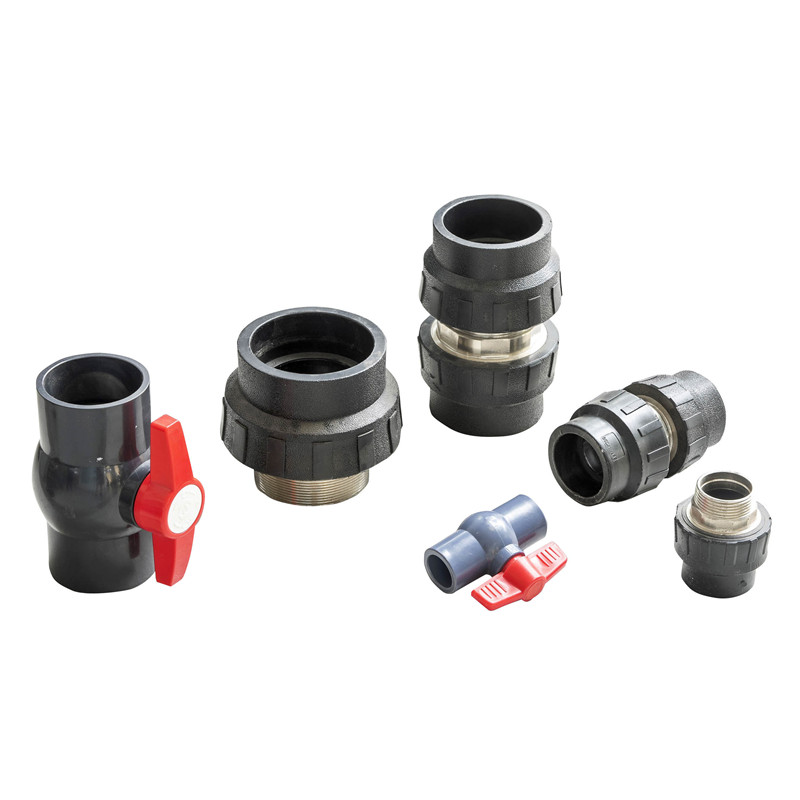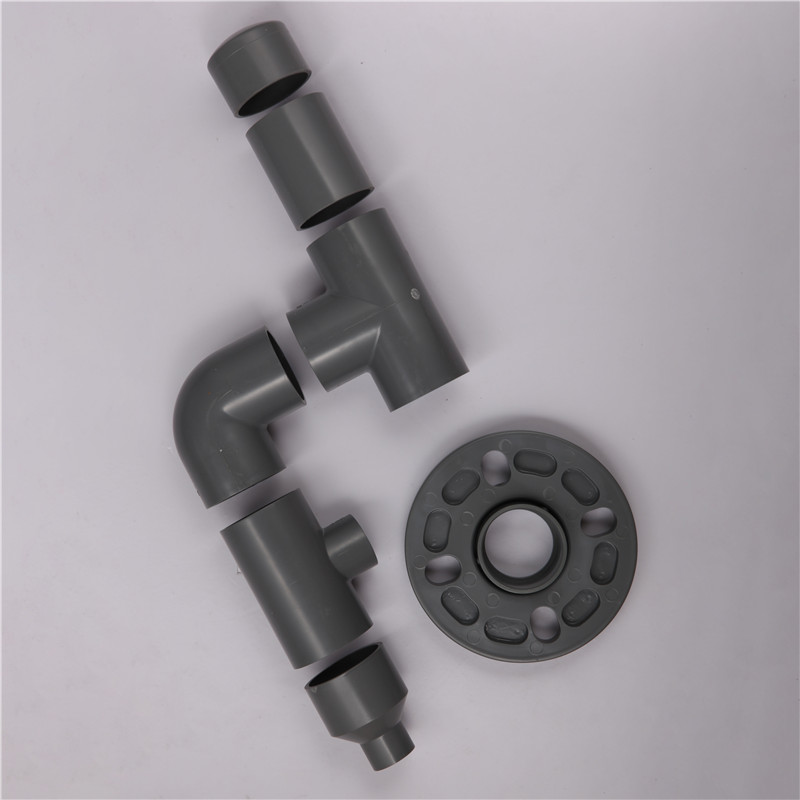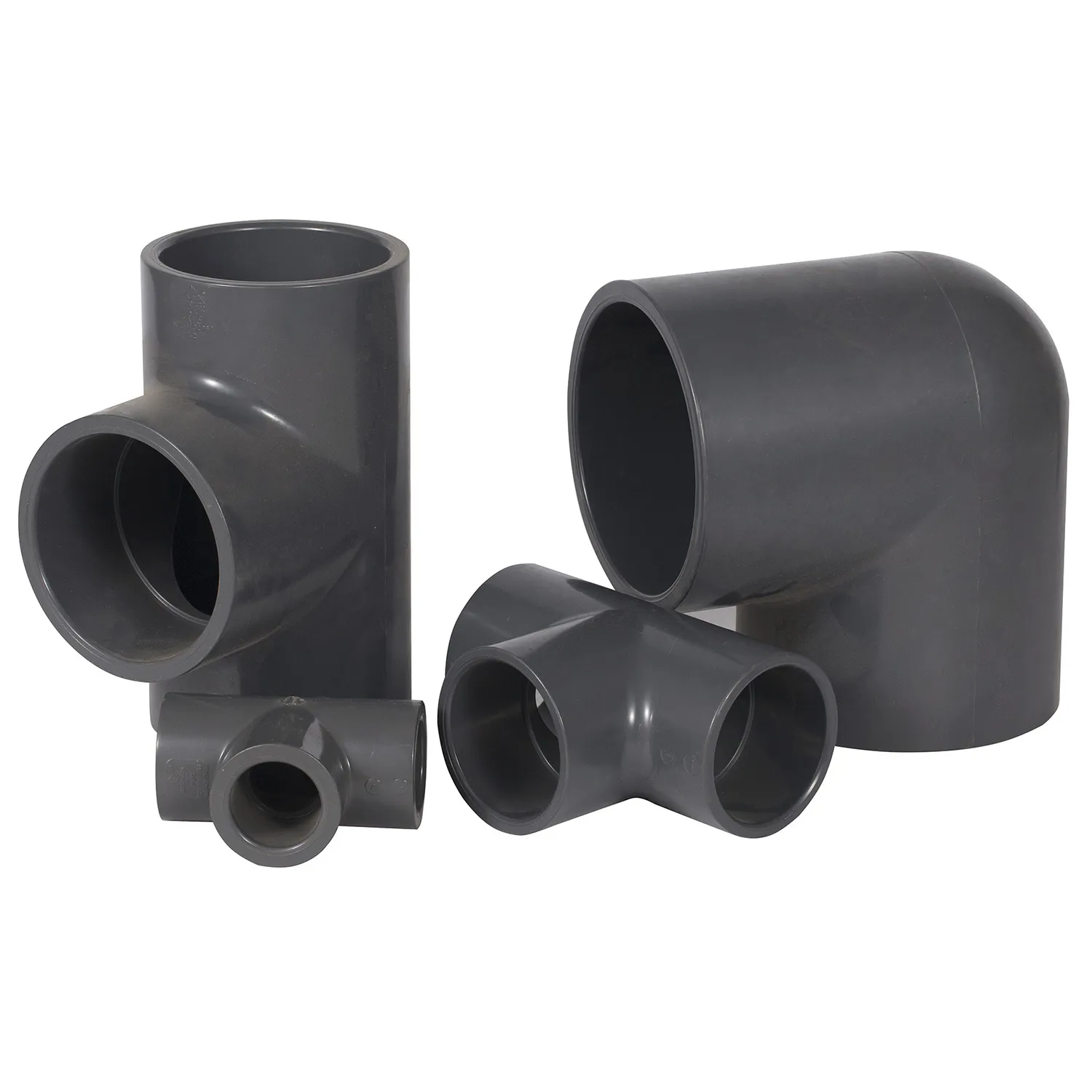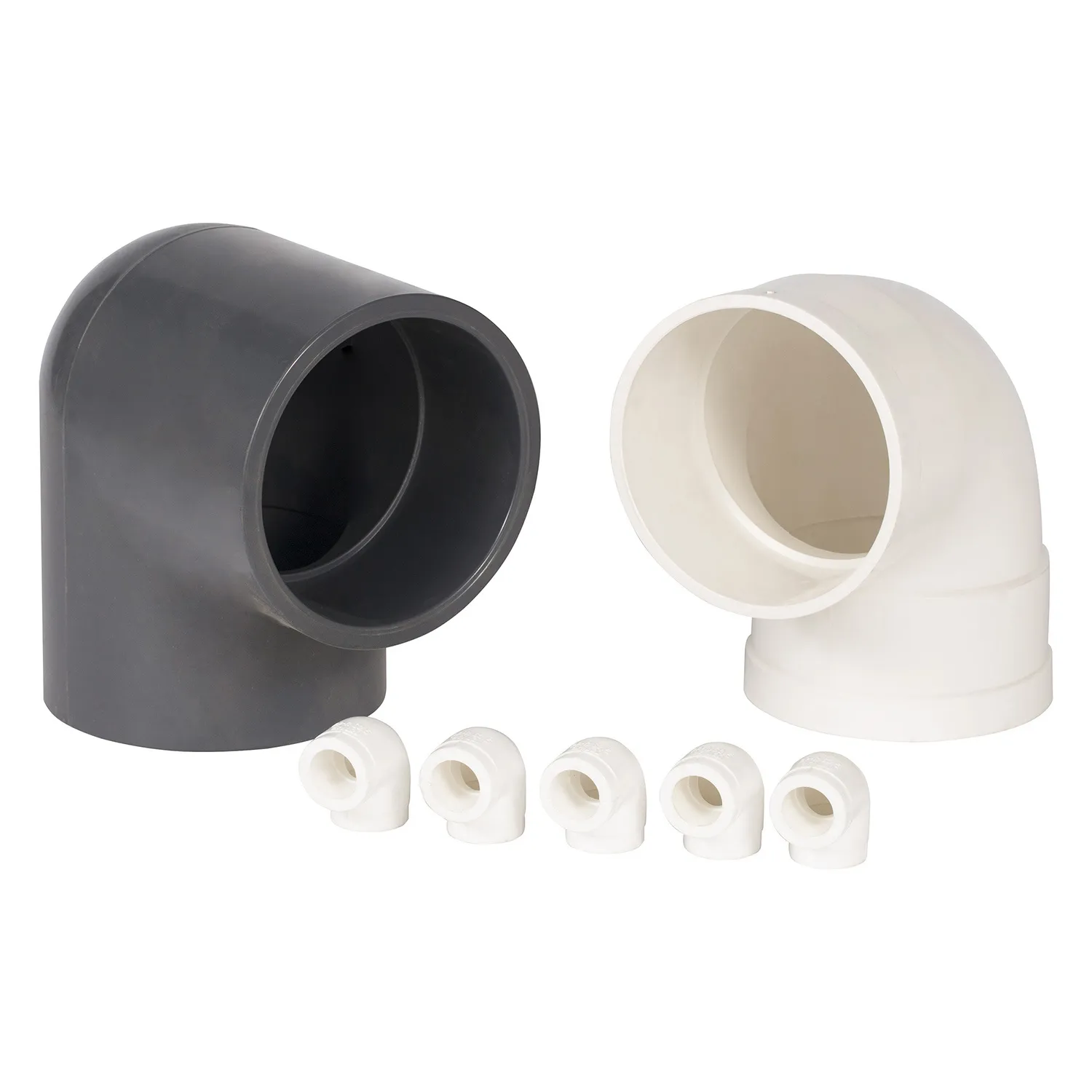Aug . 18, 2025 03:20 Back to list
Durable PVC Pipe Fittings for Plumbing & Irrigation Needs
The Crucial Role and Evolving Landscape of PVC Pipe Fittings
In modern infrastructure and industrial applications, the choice of piping components is paramount for ensuring system integrity, longevity, and operational efficiency. Among the myriad options, PVC pipe fitting stands out as a foundational element, renowned for its versatility, cost-effectiveness, and exceptional resistance to corrosion and chemical degradation. This material has transformed various sectors, from residential plumbing and agricultural irrigation to sophisticated industrial processing and municipal water management. The global market for these fittings is continuously expanding, driven by urbanization, increasing demand for potable water, and the need for durable, low-maintenance infrastructure solutions. Current trends indicate a significant shift towards more sustainable manufacturing practices, enhanced material composites for higher pressure and temperature resistance, and smarter integration with digital monitoring systems. As industries strive for greater efficiency and environmental responsibility, the advancements in PVC pipe fitting technology are pivotal in meeting these evolving demands, offering solutions that contribute to both economic viability and ecological stewardship across diverse operational environments.

The demand for robust and reliable piping systems is accelerating, particularly in sectors such as chemical processing, wastewater treatment, and power generation, where aggressive media and demanding operational conditions are common. PVC excels in these environments due to its inert nature, preventing common issues like rust, scaling, and electrolytic corrosion that plague metallic alternatives. This inherent resilience translates into significantly reduced maintenance costs and an extended service life for the entire piping system. Furthermore, the lightweight nature of PVC simplifies transportation and installation, contributing to lower labor costs and faster project completion times. The industry is also witnessing innovations in fitting designs, including quick-connect systems and specialized joints that enhance leak prevention and simplify field modifications. These ongoing developments underscore the importance of selecting high-quality PVC pipe fitting components from reputable manufacturers to ensure compliance with stringent industry standards and optimal performance in critical applications.
Precision Manufacturing Process of PVC Pipe Fittings
The manufacturing of high-quality PVC pipe fitting involves a meticulously controlled process, primarily through injection molding, ensuring precision, consistency, and durability. The journey begins with high-grade Polyvinyl Chloride (PVC) resin, often compounded with stabilizers, lubricants, and pigments to achieve desired material properties such as UV resistance, impact strength, and specific color requirements. This granular material is fed into an injection molding machine, where it is heated to a molten state. The molten PVC is then injected under high pressure into precisely engineered steel molds. These molds are critical; they define the exact dimensions and complex geometries of various fittings like elbows, tees, reducers, couplings, and caps, ensuring tight tolerances for leak-proof connections. Unlike metallic fittings that might involve casting or forging, PVC fittings leverage the thermoplastic nature of the material for efficient, high-volume production with minimal material waste, emphasizing the advantages of this advanced manufacturing technique.

Post-molding, the fittings undergo a cooling process, often involving water circulation within the mold, to solidify rapidly while maintaining dimensional stability. Ejection from the mold is followed by rigorous quality control checks. These checks are extensive, encompassing visual inspection for surface defects, dimensional verification using calipers and gauges to ensure adherence to specified tolerances (e.g., as per ASTM D2466 for Schedule 40 or ASTM D2467 for Schedule 80 PVC fittings), and pressure testing to confirm burst strength and long-term hydrostatic integrity. Adherence to international standards like ISO 1452, ANSI/AWWA C900, and NSF/ANSI 61 is paramount, particularly for potable water applications, ensuring that each PVC pipe fitting meets strict performance and safety criteria. The typical service life of a well-manufactured PVC fitting can exceed 50 years under normal operating conditions, making them a sustainable choice for long-term infrastructure projects in industries such as petrochemical, metallurgy, municipal water supply, drainage, and irrigation systems, where their corrosion resistance offers significant advantages.
Technical Specifications and Performance of PVC Pipe Fittings
Understanding the technical parameters of PVC pipe fitting is essential for proper system design and selection. These fittings are categorized by their pressure rating (e.g., Schedule 40, Schedule 80) and dimensions, which dictate their suitability for various applications. Schedule 40 fittings, for instance, are commonly used in residential and commercial plumbing, drainage, and general-purpose water distribution systems where moderate pressure is encountered. Schedule 80 fittings, with their thicker walls, are designed for higher pressure industrial applications, chemical processing, and wastewater treatment, offering enhanced durability and resistance to abrasion. Key performance indicators include maximum operating temperature (typically up to 140°F or 60°C for standard PVC), pressure rating (measured in PSI), chemical resistance spectrum, and impact strength. It's crucial to consider these parameters in conjunction with the fluid being transported and the ambient environmental conditions to ensure optimal performance and system longevity.
| Parameter | Description | Typical Range / Value | Relevant Standard |
|---|---|---|---|
| Material | Unplasticized Polyvinyl Chloride | PVC-U | ASTM D1784 |
| Max. Operating Temp. | Continuous service temperature limit | 60°C (140°F) | ASTM D1785 |
| Pressure Rating (Sch 40) | Nominal pressure at 23°C (73°F) | Up to 450 PSI (depending on size) | ASTM D2466 |
| Pressure Rating (Sch 80) | Nominal pressure at 23°C (73°F) | Up to 630 PSI (depending on size) | ASTM D2467 |
| Tensile Strength | Resistance to breaking under tension | Approx. 52 MPa (7500 psi) | ASTM D638 |
| Chemical Resistance | Inert to acids, alkalis, salts, alcohols | Excellent | ASTM D543 |

The chemical resistance of PVC pipe fitting is a key advantage, making it suitable for transporting a wide range of corrosive fluids without degradation. It resists most acids, alkalis, salts, and alcohols, which is critical in chemical plants and industrial wastewater systems. However, it is generally not recommended for use with certain solvents like ketones or aromatic hydrocarbons. Furthermore, the smooth bore of PVC fittings reduces friction losses, leading to lower pumping energy requirements and thus contributing to significant energy savings over the system's operational lifespan. This efficiency, combined with its excellent hydraulic characteristics, ensures efficient fluid flow and reduced operational costs. The lightweight nature of PVC also translates into easier handling, faster installation, and reduced structural support requirements compared to heavier metallic piping systems, further enhancing its overall economic benefits and technical superiority in various industrial and municipal applications.
Versatile Applications and Strategic Advantages of PVC Pipe Fittings
The extensive versatility of PVC pipe fitting allows it to be deployed across a broad spectrum of industries, showcasing its adaptability and robust performance. In the petrochemical industry, PVC fittings are crucial for handling non-flammable corrosive liquids and low-pressure chemical transfer lines, where their chemical inertness prevents material degradation and contamination. Within metallurgy, they are often used for acidic waste disposal systems and process water lines, effectively mitigating the risks of corrosion that metal pipes would face. For critical applications such as municipal water supply and drainage, PVC fittings are the preferred choice due to their proven longevity, resistance to tuberculation and biofilm growth, and ability to maintain water quality. Their use in agricultural irrigation systems, residential and commercial plumbing, and even HVAC condensate lines further underscores their widespread utility. The inherent advantages, such as superior corrosion resistance, longevity, and ease of installation, consistently translate into lower lifecycle costs and higher operational reliability across these diverse sectors.

Beyond their material properties, the operational advantages of PVC pipe fitting contribute significantly to project success. Their lightweight nature simplifies handling and installation, reducing labor time and costs compared to heavier materials like steel or ductile iron. The solvent cement jointing method commonly used for PVC creates a highly reliable, leak-proof connection that becomes stronger over time, minimizing potential system failures. This ease of installation also reduces the need for specialized welding equipment or heavy machinery, further streamlining project timelines. From an environmental perspective, PVC manufacturing generally has a lower carbon footprint compared to metallic pipe production, and PVC is recyclable, aligning with modern sustainability initiatives. Furthermore, their smooth inner surfaces reduce friction, promoting efficient fluid flow and decreasing pumping energy requirements, which translates directly into lower operational energy costs. These combined technical and economic advantages firmly position PVC pipe fittings as an indispensable component for modern fluid handling systems requiring reliability, efficiency, and sustainability.
Selecting the Right Manufacturer and Tailored Solutions
Choosing the appropriate manufacturer for PVC pipe fitting is critical for ensuring product quality, supply chain reliability, and long-term performance. Reputable manufacturers distinguish themselves through rigorous quality control, adherence to international standards (e.g., ISO 9001 for quality management), extensive product ranges, and robust R&D capabilities. When evaluating manufacturers, consider their years of service in the industry, their portfolio of successful application cases, and the testimonials from long-standing clients. A manufacturer with a strong track record, comprehensive certifications like NSF for potable water applications or ASTM compliance, and a commitment to innovation provides a greater assurance of product integrity. Furthermore, their ability to offer technical support, detailed product specifications, and guidance on installation best practices is invaluable. Look for partners who demonstrate transparency in their manufacturing processes and possess the capacity to meet large-scale project demands while maintaining consistent quality.
For specialized projects, customized solutions for PVC pipe fitting are often required. This might involve unique dimensions, specific pressure ratings for non-standard applications, or fittings designed to integrate with existing legacy systems. A competent manufacturer should offer bespoke engineering services, utilizing advanced CAD/CAM tools and rapid prototyping to develop custom molds and produce fittings that precisely meet unique project specifications. This collaborative approach ensures that even the most complex fluid handling challenges can be addressed with tailored PVC solutions. For instance, a client requiring fittings for an unusually corrosive chemical mix might need a specialized PVC compound, or an infrastructure project might necessitate extra-large diameter fittings not available off-the-shelf. The ability of a manufacturer to provide comprehensive design, fabrication, and testing for such custom orders is a testament to their technical prowess and commitment to client success. Through close collaboration, customized PVC pipe fittings can significantly enhance system performance and operational efficiency in niche or demanding environments, providing a superior alternative to standard components.
Commitment to Quality: Warranty, Delivery, and Customer Support
A key indicator of a manufacturer's trustworthiness and product quality is their commitment to robust after-sales support, encompassing clear warranty policies, efficient delivery schedules, and responsive customer service. Reputable suppliers of PVC pipe fitting typically offer a comprehensive warranty, often ranging from 1 to 5 years, covering manufacturing defects and ensuring product performance under specified conditions. This commitment provides peace of mind for B2B clients, knowing that their investment is protected. Delivery efficiency is another critical factor for industrial projects, where delays can lead to significant cost overruns. Leading manufacturers optimize their logistics and supply chain management to ensure prompt delivery, often providing estimated lead times for standard products (e.g., 3-7 business days for stock items, 4-6 weeks for custom orders) and transparent tracking mechanisms.
Beyond tangible products, exceptional customer support is paramount. This includes readily available technical assistance for installation queries, troubleshooting, and material compatibility guidance. A dedicated support team that understands the complexities of fluid handling systems and can offer informed advice on selecting the optimal PVC pipe fitting for specific applications adds immense value. Furthermore, a manufacturer's willingness to engage in detailed discussions about project requirements, provide comprehensive documentation, and offer post-installation support distinguishes them as a reliable long-term partner. This holistic approach to customer service, from initial inquiry through product lifecycle, builds trust and ensures that clients receive not just products, but complete solutions backed by expertise and commitment.
Frequently Asked Questions (FAQ) about PVC Pipe Fittings
Q1: What is the maximum temperature PVC pipe fittings can withstand?
A1: Standard PVC pipe fitting typically has a maximum continuous operating temperature of 60°C (140°F). Exceeding this temperature can lead to a reduction in pressure rating and material degradation.
Q2: Are PVC fittings suitable for drinking water applications?
A2: Yes, many PVC pipe fitting products are certified by organizations like NSF International (e.g., NSF/ANSI Standard 61) for potable water use, ensuring they do not leach harmful substances into the water supply. Always verify the specific product's certification for drinking water applications.
Q3: How long do PVC pipe fittings typically last?
A3: When properly installed and used within their specified operating parameters, PVC pipe fitting can have a service life exceeding 50 years, often matching or outlasting the lifespan of the entire piping system. Their resistance to corrosion and scaling significantly contributes to this longevity.
Q4: What is the difference between Schedule 40 and Schedule 80 PVC fittings?
A4: The primary difference lies in wall thickness and pressure rating. Schedule 80 PVC pipe fitting has a thicker wall and thus a higher pressure rating than Schedule 40 fittings of the same nominal pipe size. Schedule 40 is typically used for drainage and general plumbing, while Schedule 80 is preferred for industrial processes and higher pressure applications.
Authoritative References
- American Society for Testing and Materials (ASTM) International. ASTM D1785 - Standard Specification for Poly(Vinyl Chloride) (PVC) Plastic Pipe, Schedules 40, 80, and 120.
- American Society for Testing and Materials (ASTM) International. ASTM D2466 - Standard Specification for Poly(Vinyl Chloride) (PVC) Plastic Pipe Fittings, Schedule 40.
- American Society for Testing and Materials (ASTM) International. ASTM D2467 - Standard Specification for Poly(Vinyl Chloride) (PVC) Plastic Pipe Fittings, Schedule 80.
- International Organization for Standardization (ISO). ISO 1452 - Plastics piping systems for water supply and for buried and laid drainage and sewerage under pressure - Unplasticized poly(vinyl chloride) (PVC-U).
- NSF International. NSF/ANSI Standard 61 - Drinking Water System Components – Health Effects.
-
HDPE Natural Sheet: Durable, Food-Grade & Versatile Plastic Solutions
NewsAug.27,2025
-
Durable Glossy PVC Rigid Sheet | Premium High-Shine Panels
NewsAug.26,2025
-
Durable PP Rigid Sheet: Lightweight, Chemical Resistant Solutions
NewsAug.21,2025
-
PVC Grey Sheet for Extraction: Chemical Resistant & Durable
NewsAug.19,2025
-
Durable PVC Pipe Fittings for Plumbing & Irrigation Needs
NewsAug.18,2025
-
HDPE Steel Belt Reinforced Spiral Corrugated Pipe | High Strength
NewsAug.17,2025

